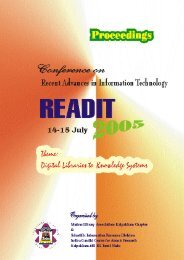READIT-2007 - Indira Gandhi Centre for Atomic Research
READIT-2007 - Indira Gandhi Centre for Atomic Research
READIT-2007 - Indira Gandhi Centre for Atomic Research
You also want an ePaper? Increase the reach of your titles
YUMPU automatically turns print PDFs into web optimized ePapers that Google loves.
‘Bodhi’ : The Institutional Knowledge Repository of<br />
IGCAR<br />
E.Soundararajan*, C.Jayakumar* and M.Somasekharan*<br />
Abstract<br />
Abstract: The collective acquired in<strong>for</strong>mation of an organization is called the ‘institutional<br />
knowledge’. The centralized Knowledge Repository uses standard taxonomies to consolidate<br />
in<strong>for</strong>mation into one place allowing knowledge to be searched and retrieved with maximum efficiency<br />
and accuracy. Many organizations have realized the value of institutional knowledge and already<br />
initiated knowledge management systems that collect, store, redistribute, utilize and ultimately<br />
leverage the institutional knowledge <strong>for</strong> the benefit of the organization. All the organizations, in<br />
particular the R&D institutions like IGCAR need to build knowledge repository on its specific areas of<br />
interest. Once created, the IKR will act as a vehicle <strong>for</strong> knowledge dissemination, sharing and<br />
transfer. This paper gives a comprehensive view on building IKR at IGCAR.<br />
Keywords: Institutional Knowledge Repositor, Knowledge Management, Digital Library,<br />
Knowledge Organization<br />
1. THE KNOWLEDGE ORGANIZATIONS<br />
Today’s organizations must survive in the environment that is complex and<br />
highly competitive. The tremendous growth of in<strong>for</strong>mation and communication<br />
technologies has made the organizations to continuously strive to improve their<br />
per<strong>for</strong>mance and goals. After the in<strong>for</strong>mation explosion through Internet,<br />
organizations have become more conscious towards in<strong>for</strong>mation management and<br />
now they are evolving as knowledge organizations. A significant challenge facing the<br />
modern organizations is how to utilize the in<strong>for</strong>mation <strong>for</strong> overall improvement. A<br />
knowledge organization must necessarily become a learning organization so that the<br />
entire institution will learn during the daily routine and be able to adapt quickly to<br />
changing environment<br />
2. CHALLENGES OF KNOWLEDGE SHARING<br />
The challenging barrier <strong>for</strong> knowledge organization is that of creating a<br />
culture in which knowledge and knowledge sharing are valued and encouraged. R&D<br />
organizations generate knowledge mainly from within the organization. Another<br />
aspect is the tapping of tacit knowledge. The knowledge that resides in expert’s mind<br />
has to be recorded so that when an expert leaves the organization, his knowledge will<br />
be available <strong>for</strong> the benefit of organization. The issues to be addressed are<br />
• Appreciation of importance of knowledge captured<br />
• Knowledge loss while capturing<br />
• Mechanisms <strong>for</strong> transferring and trans<strong>for</strong>ming knowledge<br />
* Scientific In<strong>for</strong>mation Resource Division, <strong>Indira</strong> <strong>Gandhi</strong> <strong>Centre</strong> <strong>for</strong> <strong>Atomic</strong> <strong>Research</strong><br />
Kalpakkam, Tamilnadu –603 102, Email: sound@igcar.ernet.in<br />
I-1

















